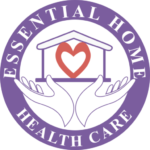Home health care refers to various health care services that can be provided in the comfort of your home in the event of an illness or injury. Home health care is typically less expensive, more convenient, and equally effective as care received in a hospital or skilled nursing facility (SNF). What is home healthcare?

Skilled home health care services include the following:
- Wound management for pressure ulcers or surgical wounds
- Education for patients and caregivers
- Nutritional or intravenous therapy
- Injections
- Following up on serious illnesses and unstable health statuses
What can I anticipate from my home health care?
- To begin treatment, a doctor’s order is required. When your doctor refers you for home health care, the home health agency will schedule an appointment and come to your home to discuss your needs and ask you some health-related questions.
- The Essential home health agency staff will also discuss your care with your doctor and keep him or her updated on your progress.
- It is critical that home health aides see you as frequently as the doctor has ordered.
Here are some examples of what the home health care staff should do:
- Examine what you eat and drink.
- Examine your blood pressure, temperature, heart rate, and breathing patterns.
- Check that you are taking your prescription, other medications, and any treatments as directed.
- Inquire if you are in pain.
- Examine your home’s security.
- Teach you about your care so that you can look after yourself.
- Organize your care. This means they must maintain regular communication with you, your doctor, and anyone else who provides care for you.
Why home health care is important
- Home care reduces costs. Many times, an ageing loved one is admitted to a long-term care facility because they are unable to manage one aspect of their care at home, such as meal preparation or bathing, due to a lack of options.
- Home care can significantly reduce not only the cost of care but also the burden on patients and taxpayers by providing only the services people require at home.
- Home care preserves dignity. While long-term care facilities strive to provide the best experience possible, many aspects of care, such as sharing personal spaces (bedroom, bathroom) and having multiple caregivers assist with toileting and bathing, are undesirable.
- The significance of home nursing is also reflected in the fact that patients who receive home care benefit from developing trusting relationships with consistent caregivers and from receiving care in the privacy of their own homes.
- Home care is good for the soul. Ageing can present a number of challenges and obstacles, such as losing loved ones as they age and die, losing the ability to drive, and losing overall independence.
- The significance of home care nursing is that it allows people to keep the things that are most important to them while still receiving the assistance and care they require: the familiarity of their own home, the comfort of their own bed, and all of the memories made at the kitchen table over the years.
- Home care improves security. Our ageing population is more likely to fall due to declines in vision, hearing, balance, and mobility. This risk can be increased by unfamiliar surroundings. Potential hazards, such as rugs or small steps, may go unnoticed.
- On this front, the value of home nursing cannot be overstated. Home care providers can reduce the risk of surprises, falls, and debilitating and painful injuries by providing the assistance they require in an environment they are familiar with.
- Home care fosters caring relationships. Unfortunately, many elderly people discover that their relationships with loved ones change when they leave their homes.
- Patients who can receive care in their own homes, on the other hand, can welcome visitors, invite family members to stay overnight, and have private conversations without interruption. They can receive phone calls and house calls whenever they want, and there are no visiting hours restrictions.
- Home care provides loved ones with a choice. Home care plays an important role in the healthcare system by giving patients more control over their care. In most cases, it is extremely difficult to leave a facility once a person has moved in. Choosing home care while it is a viable option allows you to keep your options open for as long as possible. Essential home health is best for medicare coverage for home care.
Home care when?
What does the expansion of home care services mean for you? Home nursing is important for many patients, including those who need:
- housekeeping (dishes, laundry, cooking)
- appointment transportation
- Reminders, prescription pickup
- supermarkets
- Aid with toileting, dressing, oral care, and bathing
- 24/7 security and comfort
- companionship
- When determining the best option for you or a loved one, consider local services, cost and payment options, family availability, and preferences.
- Choose a senior care provider
HomeHealth care’s advantages
- Home care is cost-effective. An elderly loved one is often placed in a long-term care facility due to a lack of options, such as meal preparation or bathing.
- Home care can reduce costs and burdens on patients and taxpayers by providing only needed services at home.
- Home care preserves dignity. Long-term care facilities aim to provide the best care possible. Still, many aspects are undesirable, such as sharing personal spaces (bedroom, bathroom) and having many caregivers assist with toileting and bathing.
- Patients who receive home care can establish trusting relationships with consistent caregivers and receive care in the privacy of their home.
- A home care worker brings a tray to a senior with a cane. Homehealth care comforts. Aging can include losing loved ones, losing the ability to drive, and losing independence.
- Home care nursing allows people to keep the things that matter most to them while getting the care they need: the familiarity of home, the comfort of their own bed, and all those kitchen table memories.
- Home care increases safety. Vision, hearing, balance, and mobility declines increase the risk of falls in the elderly. Unfamiliar surroundings increase risk. Rugs and small steps aren’t always anticipated.
- Home nursing is crucial here. Home care providers can reduce the risk of surprises, falls, and debilitating injuries by providing care in a familiar environment.
- Home care nurtures relationships. When elderly people move out, their relationships with loved ones often change.
- Patients who can receive care at home can have visitors, overnight family, and private conversations. No visiting hours or phone calls are limited.
- Home care gives family members options. Home care allows patients to make more careful decisions in the healthcare system. Once a person moves in, it’s difficult to leave. Choosing home care while it’s an option helps preserve options.
Homehealth care Importance
People are living and staying mobile longer, so today’s elderly are ageing differently than 50-100 years ago. Home-based care is important because it allows people to age in familiar surroundings.
Home care keeps seniors safe, happy, and comfortable. 90% of seniors want to age in their own apartment or home. Home care is a big decision. Read Who qualifies for home health care services; in our other post. Essential Home Health provide the best for stroke recovery and rehabilitation. For more information, call us at 847-813-6301.
